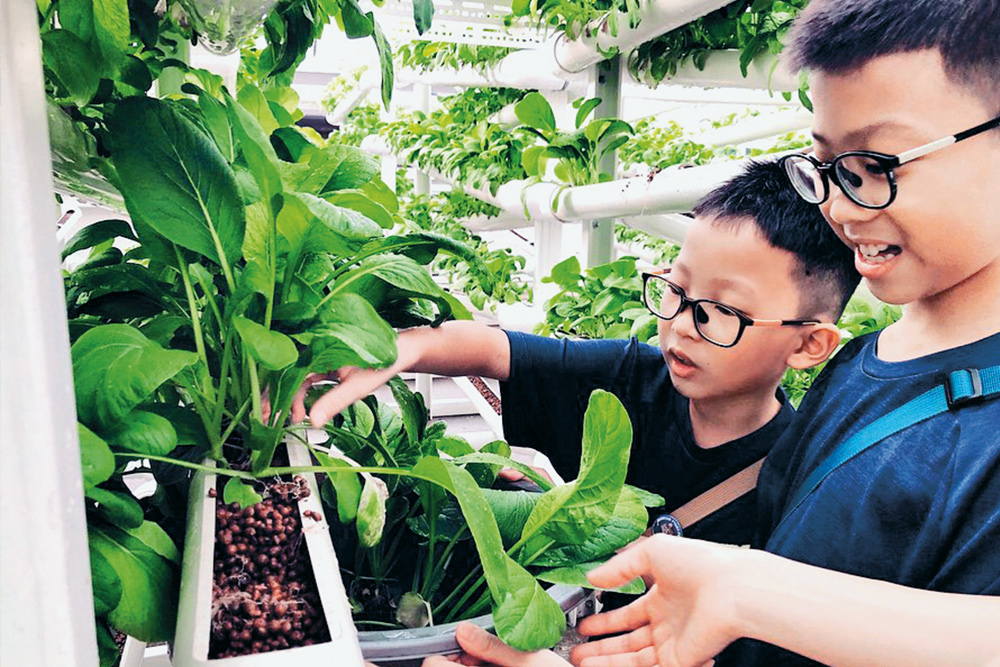Taking Farming into the Future
Ms Danielle Chan (Arts and Social Sciences ’17) is at the forefront of Singapore’s move towards local food production and stronger food security.
WHO SHE IS
Meet Ms Danielle Chan, co-founder of Citiponics. The company’s 1,800 sqm urban farm, on the top floor of an under-utilised HDB multi-storey carpark in Ang Mo Kio, produces 3 to 4 tons of pesticide-free vegetables monthly, using a proprietary ‘Aqua Organic System’ that pumps water and nutrients through space-saving vertical growing towers.
"I grew up in an agricultural environment and, as such, the farm was always my playground,” says
Ms Danielle Chan, 26. Her company, Citiponics, is an urban farming business that is at the forefront of local food production – using converted carpark spaces, as part of the Government’s plan to meet 30 per cent of Singapore’s nutritional needs through homegrown produce by 2030.
The Straits Times reported on 13 May 2020 that nine new multi-storey carpark sites are up for tender.
For Ms Chan, urban farming is simply an extension of a lifestyle she has always lived. Her mother owns
a vegetable farm in Malaysia. “Growing up, I never had to worry about buying vegetables from the supermarket or doubt my food source,” she says. “It was during a time of rapid urbanisation in Singapore, and my mother was one of the Singaporeans who decided to open farms in Malaysia instead.” Some of
her fondest childhood memories are of being part of one-day tours that took Singaporeans on farm visits, packing vegetables, and doing door-to-door deliveries. “I was lucky to be able to gain exposure and build
an understanding of the intricacies of running a farm business,” she adds. With first-hand knowledge of the wastage and inefficiencies of the traditional farming industry, Ms Chan knew that she “wanted to change
the way farming is done” as well as share the blessing of the farm-to-table experience that she has had with others. Apart from the know-how, her mother also imparted a strong work ethic. “From her, I learned the concept of ‘what you reap, you will sow'. This has accompanied me through the ups and downs of running a startup. We have to put in the work — there are no shortcuts. Whatever you do, do it with sincerity and genuine passion.”
A PURPOSE-DRIVEN EDUCATION
It was during her undergraduate days at the National University of Singapore that Ms Chan explored the idea of Citiponics, and started the business with a family friend who has a strong background in agriculture. “We wanted to understand how food production could be reimagined in Singapore, after seeing that almost 90 per cent of our food supply is still imported,” she explains. “We also wanted to see how we could be creative and tap on under-utilised spaces to contribute to food security and food safety, sustainably and efficiently.” With this business in mind, Ms Chan spent her years in NUS trying to equip herself with skillsets that would be relevant in building Citiponics, such as software development, entrepreneurship, user experience design and marketing. Opportunities for developing these skills came not only through her major in Communications and New Media, but also through internships with technology startups as part of her NUS Overseas Colleges experience. “As New York is a hotbed for agritech companies, I spent my time there visiting indoor and rooftop farms and attending agritech events, trying to understand the industry and the technology available. I hoped to gain more knowledge so I could grow Citiponics.”
Ms Chan names Professor Lu Weiquan (Computing ’08) of the NUS School of Computing as an influence on her approach to Citiponics. “I took a couple of modules under him such as
User Experience Design for AR/VR and AR/VR in Mobile Design, and some things he taught have stuck with me until today,” she says. “One is that before building anything from scratch, we need to analyse the assumptions of our world that we take for granted. Even while growing Citiponics now, this taught me that to create any real breakthroughs with innovations, I need to be able to unlearn what I know of the world and to be aware of existing biases. Running a commercial farm that coexists with the community was a brand new thing, and one of the reasons why this model could work is because we are able to unlearn what we know of the farming and food consumption processes and rethink our processes.” Prof Lu also impressed upon her the importance of going back to basics when solving problems. “We first need to question if it can be resolved in another way — what looks right may not necessarily feel right. Solutions for technological problems may not come in the form of robots or complex software. We have to go back to basics and ask ourselves if we can resolve a problem in an efficient, simple and frugal manner.”
![]()
Running a commercial farm that coexists with the community was a brand new thing, and it worked because we were able to unlearn what we knew of the farming processes and rethink them.
A SUCCESS ‘STOREY’ IN THE MAKING
After graduating in 2017, Ms Chan served a stint at IBM as a business transformation consultant to gain corporate experience before focusing on Citiponics full-time. Citiponics’ venture into building carpark farms began with a testbed project at an under-utilised rooftop carpark in Taman Jurong, which was solely used for community purposes. The team used that time to research, develop and finetune its sustainable Aqua Organic System farming technology for farming set in community spaces. With the experience from running the prototype farm, they were able to pitch for a pilot commercial carpark rooftop farm, Citiponics@Ang Mo Kio. “Our proprietary vertical farming technology, Aqua-Organic System (AOS), belongs to a solid-based, soilless culture — it is a different farming method from both hydroponics and traditional soil farming,” explains Ms Chan. “This system was designed and created by Citiponics in Singapore with sustainability
in mind.”
The AOS farming technology distills the complexities of farming into three simple steps: seeding, transplanting and harvesting, all in one location and system. “We are able to grow up to 25 types of vegetables using these vertical structures,” says Ms Chan. Georgina lettuce — Citiponics’ versatile lettuce crossbreed of Celtuce and Romaine — is the main crop produced at Citiponics, with others being nai bai, cai xin, sweet basil, Thai basil and mixed amaranth. These are sold at NTUC supermarkets as well as directly to neighbouring residents and customers island-wide. AOS is a zero-waste system — every component is recyclable, unlike traditional farming, which generates waste. The system also minimises water consumption: every drop is kept in a closed loop within the system. “We use one-tenth of the water hydroponics requires and a hundredth of what you need for traditional farming,” says Ms Chan. Its vertical nature also means it is seven times more productive than traditional farming. “It is an environment that lets us preserve the nutritional value and natural taste of the vegetables, and our products are also pollutant- and pesticide-free.” The cherry on top? “Our technology is anti-mosquito breeding,” she adds.
 Now Growing
Now Growing
According to the Agri-Food and Veterinary Authority of Singapore, there were
194 vegetable, fish and egg farms here in 2018, up from 173 in 2010. In 2018,
12,200 tonnes of leafy vegetables were grown locally, making up 13 per cent of the total consumed in Singapore, while 9 per cent of all fish consumed here — some 4,600 tonnes — was reared locally.
Source: www.todayonline.com/singapore/super-fish-speedy-rice-singapores-farming-revival
 Visitors to the farm are encouraged to get a hands-on feel of the processes involved.
Visitors to the farm are encouraged to get a hands-on feel of the processes involved.
Ms Chan’s dream is to influence the growth of the #FarmtoTable movement in Singapore. “I would like to redefine how people think about farming, as well as how they see their relationship with food,” she explains. “Most of us haven’t grown up in a rural environment, so we tend not to question our food sources. But by connecting the community to their food source, Citiponics hopes to raise awareness of food safety, security and sustainability.”
With more rooftop carparks being made available, it looks like Ms Chan’s dream of scaling up operations may come to pass soon. “We would like to enhance our contribution to local food resilience by introducing hyperlocal urban vertical farms throughout Singapore,” she says, pointing out that COVID-19 has raised awareness of the importance of local produce. “Because of this, we have introduced direct farm-to-home delivery to ensure that consumers have access to freshly-harvested pesticide-free vegetables.” She envisions Citiponics being a supportive environment for the next generation of agritech innovators — here and elsewhere. She says, “As food security, safety and sustainability are global issues, I also hope that we get to bring Citiponics’ farming solution to other countries.”